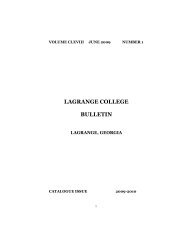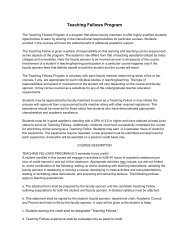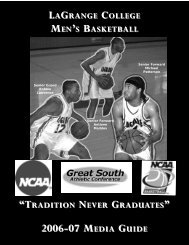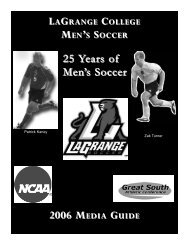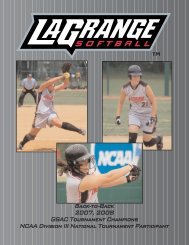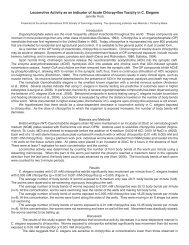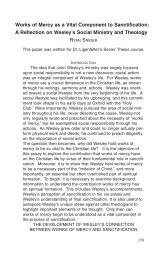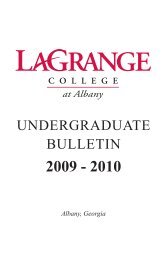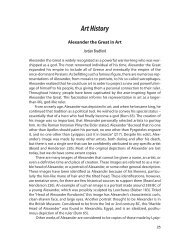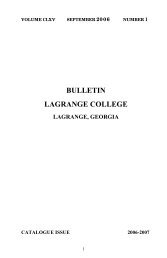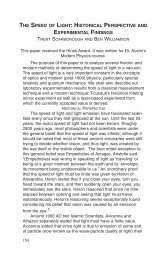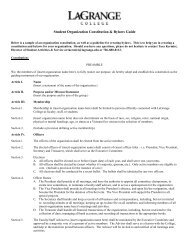undergraduate bulletin - LaGrange College
undergraduate bulletin - LaGrange College
undergraduate bulletin - LaGrange College
Create successful ePaper yourself
Turn your PDF publications into a flip-book with our unique Google optimized e-Paper software.
Like the Honor Code, the Social Code is the responsibility of every student, faculty member, and<br />
staff member at <strong>LaGrange</strong> <strong>College</strong>. The Social Code attempts to instill in every member of the<br />
student body a sense of moral and community responsibility. As such, <strong>LaGrange</strong> <strong>College</strong> expects<br />
its students to adhere to community standards. Likewise, if some fail to live up to these codes of<br />
conduct, then the <strong>College</strong> expects students to report violations of the Social Code to the Social<br />
Council. In this way, students assume the obligation of upholding the integrity of their<br />
community and of ethically preparing themselves for the world beyond college.<br />
The <strong>College</strong> has established guidelines and policies to assure the well-being of the community.<br />
In general, the <strong>College</strong>‘s jurisdiction is limited to events that occur on <strong>College</strong> property;<br />
however, the <strong>College</strong> and the Social Council reserve the right to hear cases that concern students‘<br />
behavior when they are off-campus in the name of the <strong>College</strong> (e.g., with a Jan Term travel<br />
course, an academic fieldtrip, or a campus organization social), especially when such situations<br />
could be regarded as an adverse reflection on the <strong>College</strong>‘s mission.<br />
The <strong>College</strong> reserves the right to dismiss at any time a student who, in its judgment, is<br />
undesirable and whose continuation in the school is detrimental to himself or his fellow student.<br />
Furthermore, students are subject to federal, state, and local laws as well as <strong>College</strong> rules and<br />
regulations. A student is not entitled to greater immunities before the law than those enjoyed by<br />
other citizens generally. Students are subject to such disciplinary action as the administration of<br />
the <strong>College</strong> may consider appropriate, including possible suspension and expulsion for breach of<br />
federal, state, or local laws or of <strong>College</strong> regulations. This principle extends to conduct off<br />
campus that is likely to have an adverse effect on the <strong>College</strong> or on the educational process or<br />
that stamps the offender as an unfit associate for the other students.<br />
A complete description of the Social Code, its policies, and its processes can be found in the<br />
Student Handbook. Copies of the Handbook are available in the Office of Student Life as well as<br />
on the <strong>College</strong>‘s PantherNet Web site under ―Campus Resources.‖<br />
STATEMENT OF POLICY ON HARASSMENT<br />
All members of the <strong>College</strong> community have the right to be free from discrimination in the form<br />
of harassment. Harassment may take two forms: (1) creating a hostile environment, and (2) quid<br />
pro quo.<br />
A hostile, demeaning, or intimidating environment created by harassment interferes with an<br />
individual's full and free participation in the life of the <strong>College</strong>.<br />
Quid pro quo occurs when a position of authority is used to threaten to impose a penalty or to<br />
withhold a benefit in return for sexual favors, whether or not the attempt is successful. Sexual<br />
harassment may involve behavior by a person of either gender against a person of the same or<br />
opposite gender. It should be noted that the potential of sexual harassment exists in any of the<br />
following relationships: student/student, faculty/student, student/faculty, and faculty/faculty.<br />
Here and subsequently, "faculty" refers to faculty, staff, and administration. Because of the<br />
inherent differential in power between faculty and students, sexual relationships between faculty<br />
and students are prohibited.<br />
Sexual harassment may result from many kinds of behavior. These behaviors may range from the<br />
most egregious forms, such as sexual assault, to more subtle forms. Explicit behaviors include<br />
but are not limited to requests for sexual favors, physical assaults of a sexual nature, sexually<br />
offensive remarks, and rubbing, touching, or brushing against another‘s body. More subtle<br />
35



